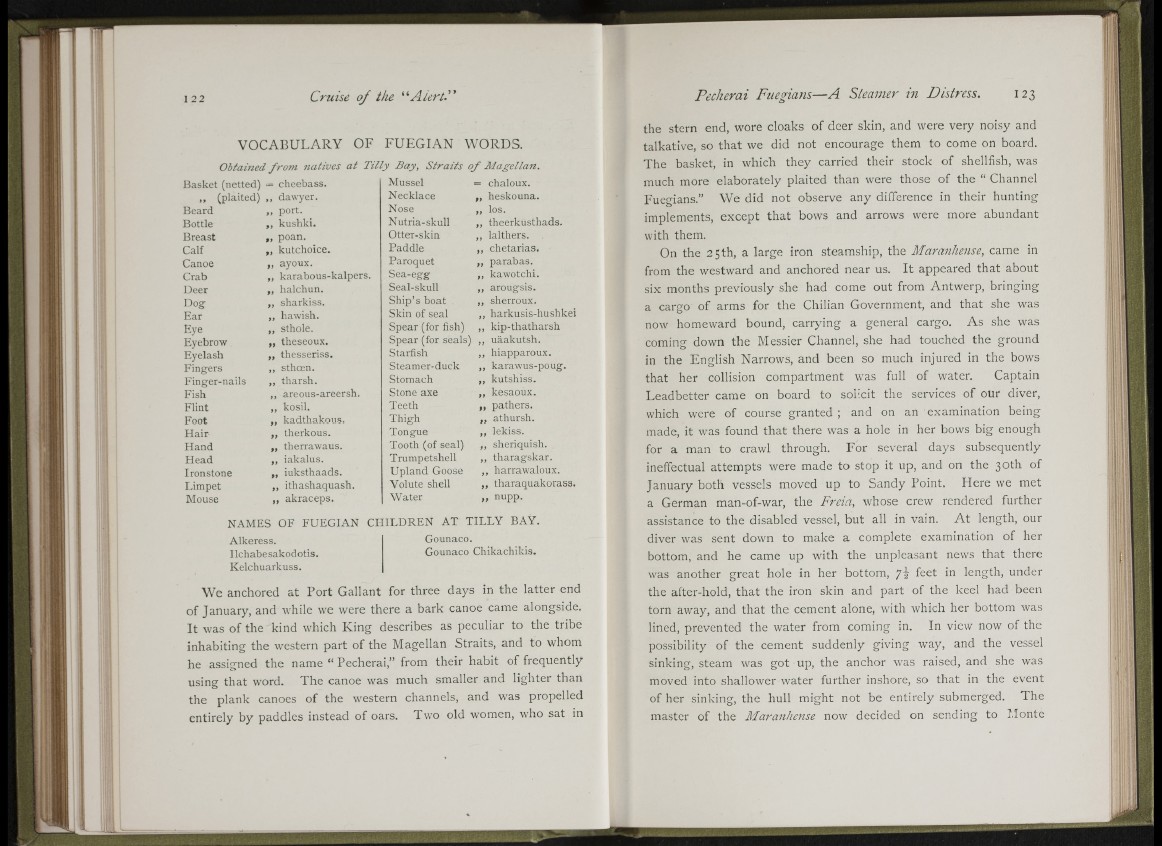
«
UMl l!
V O C A B U L A R Y OF FUEGIAN WORDS.
Obtained fr om natives at Tilly Bay, Straits o f Magellan.
Basket (netted) = cheebass.
,, (plaited) ,, dawyer.
„ port.
,, kushki.
,, poan.
,, kutchoice.
,, ayoux.
„ karabous-kalpers.
,, balcbun.
,, sbarkiss.
,, bawisb.
,, stbole.
,, tbeseoux.
,, tbesseriss.
,, stboen.
,, tbarsb.
,, areoiis-areersb.
,, kosil.
,, kadtbakous.
,, therkous.
„ tberrawaus.
,, iakalus.
,, iuksthaads.
,, ithashaquash.
,, akraceps.
Mussel
Necklace
Nose
Nutria-skull
Otter-skin
Paddle
Paroquet
Sea-egg
Seal-skull
Ship’ s boat
Skin of seal
Spear (for fish)
Spear (for seals)
Starfish
Steamer-duck
Stomach
Stone axe
Teeth
Thigh
Tongue
Tooth (of seal)
Trumpetshell
Upland Goose
Volute shell
Water
- chaloux.
,, heskouna.
„ los.
,, theerkusthads.
,, lalthers.
,, chetarias.
,, parabas.
kawotchi.
,, sherroux.
,, harkusis-hushkei
,, kip-thatharsh
,, uaakutsh.
,, hiapparoux.
,, karawus-poug.
„ kutshiss.
,, kesaoux.
,, pathers.
,, athursh.
,, lekiss.
,, sheriquish.
,, tharagskar.
,, harrawaloux.
,, tharaquakorass.
„ nupp.
NAMES OF FUEGIAN CHILDREN AT T IL L Y BAY.
Alkeress.
Gounaco.
Ilchabesakodotis.
Gounaco Chikachikis.
Kelchuarkuss.
We anchored at Port Gallant for three days in the latter end
of January, and while we were there a bark canoe came alongside.
It was of the kind which King describes as peculiar to the tribe
inhabiting the western part of the Magellan Straits, and to whom
he assigned the name “ Pecherai,” from their habit of frequently
using that word. The canoe was much smaller and lighter than
the plank canoes of the western channels, and was propelled
entirely by paddles instead of oars. Two old women, who sat in
Pecherai Fuegians— A Steamer in Distress. 123
the stern end, wore cloaks of deer skin, and were very noisy and
talkative, so that we did not encourage them to come on board.
The basket, in which they carried their stock of shellfish, was
much more elaborately plaited than were those of the “ Channel
Fuegians.” We did not observe any difference in their hunting
implements, except that bows and arrows were more abundant
with them.
On the 25th, a large iron steamship, the Maranhense, came in
from the westward and anchored near us. It appeared that about
six months previously she had come out from Antwerp, bringing
a cargo of arms for the Chilian Government, and that she was
now homeward bound, carrying a general cargo. As she was
coming down the Messier Channel, she had touched the ground
in the English Narrows, and been so much injured in the bows
that her collision compartment was full of water. Captain
Leadbetter came on board to solicit the services of our diver,
which were of course granted ; and on an examination being
made, it was found that there was a hole in her bows big enough
for a man to crawl through. For several days subsequently
ineffectual attempts were made to stop it up, and on the 30th of
January both vessels moved up to Sandy Point. Here we met
a German man-of-war, the Freia, whose crew rendered further
assistance to the disabled vessel, but all in vain. A t length, our
diver was sent down to make a complete examination of her
bottom, and he came up with the unpleasant news that there
was another great hole in her bottom, feet in length, under
the after-hold, that the iron skin and part of the keel had been
torn away, and that the cement alone, with which her bottom was
lined, prevented the water from coming in. In view now of the
possibility of the cement suddenly giving way, and the vessel
sinking, steam was got up, the anchor was raised, and she was
moved into shallower water further inshore, so that in the event
of her sinking, the hull might not be entirely submerged. The
master of the Maranhense now decided on sending to Monte
!li'
* À—